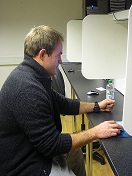An ex All-Black and Cardiff Blues captain, former rugby player Xavier Rush is currently training here at Access Training after retiring from sports and deciding to earn the qualifications to start a new career in property development. After completing an intenstive kitchen fitting course, he has decided to continue his training and earn additional qualifications in electrics and plumbing. We caught up with him again as he progressed through the professional electrician's course to see how he's getting on with starting his new life...
 So how has your electrical training been going so far?
So how has your electrical training been going so far?
Busy, very busy! But good – I’ve been doing my Part P and 17th Edition, had an exam yesterday which I passed so I’m very happy about that. I wasn’t looking forward to doing a resit on Friday so I’m glad I’ve managed to avoid that. But it’s an intense course this one, and you don’t have much time to muck around. It’s intense, but its short and you get a lot of information which is great.
How have you found the balance between theory and practical learning?
You’re getting a good mix of both here. I think Martin [One of the electrical tutors] teaches it very well. I’ve enjoyed his style and the environment of working with all the other students as well. We come from all walks of life and backgrounds, but we’ve all got that one common goal of getting our qualifications. And we’re all here to learn, it’s very different to school – everyone’s here because they want to be here.
How has the electrical course compared to the kitchen fitting you were doing previously?
Kitchen fitting and carpentry is a lot more hands-on, which I’m more used to. The electrics is where you have to get the old brain working in gear. It’s been a while since I’ve had to sit in a classroom but again as I said Martin makes it interesting and mixes it up. And that’s helped us all.
Did you find you were fully prepared for the exams?
Well it’s a two and a half/three week course, so you’ve just got to make sure that you keep yourself pretty quiet over these weeks so at the end of it you get the pass mark. The first exam wasn’t bad at all but this one...it was an open book exam with the regs but it can be tricky. Its multiple choice (or multiple guess in some situations!) but I feel we covered it well in our teachings and you’ve just got to know your way around the book really.
We all passed in our class so we must have been fairly well prepared, especially when you never know what they’re going to chuck out at you. Every exam is different from everyone else’s.
So what will you be moving onto next?
I’m doing my PAT testing now, then have a nice week’s break and come back and nail my plumbing. I’m over the moon that I’m now a qualified domestic installer than can self-certify my own work. If you look at apprenticeships when I was finishing school that would have been a seven year course and even at the end you might not know as much as you’re given here. You’d have a fair bit of experience on the job but you’re in a good position to move on now and either do your own work if you feel confident enough or work for someone for a while before that.
Finally, what advice would you give to someone thinking of doing an electrical course or even completely changing careers like you have?
They need to remember that the courses are intense – you learn a lot of information so you want to make sure you go home, you get your sleep, your rest and your revision. Because you are slamming a lot of information into a small amount of time so you want to make sure you take in as much of it as possible. It’s a fun, enjoyable environment to learn in and the tutors. You’re learning from top guys so it’s been well worth the experience.
If you’ve wanted a career and want more of a hands-on trade and a change from what you’ve been doing I definitely recommend it. I certainly wouldn’t be here if I thought it was a waste of time. This is a great environment to come in and start.
We'll be catching up with Xavier Rush again after his week off, so if you have any questions you'd like to ask him please let us know via Twitter or Facebook. If you would like more information on taking the steps to change your career and become a professional tradesperson, please get in contact with one of our course advisers. Access Training offer courses in plumbing, electric, gas and construction (plastering, tiling, carpentry and painting & decoration) and they'd be happy to answer any questions. You can contact them on 088 345 7492.